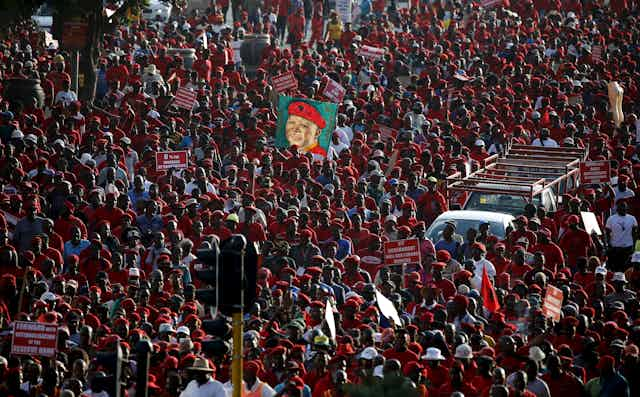South Africa is increasingly displaying evidence of radicalism, racialised rhetoric and general disenchantment. There are similarities between what’s happening today and the mood in South Africa in the 1940s – the results of which altered the country’s course. For the worse.
A pertinent dynamic, visible in South Africa’s political landscape since the 1940s, has been moderates moving to the fore and then, intermittently, to the background. They are replaced by what could arguably be called radicals or exclusivist nationalists.
This dynamic has influenced and continues to influence South Africa’s political and socioeconomic prospects. Moderates recognise that, in politics, no-one has a monopoly on truth or virtue. Radicals or exclusivist nationalists pursue a form of nationalism that is driven primarily by a keen sense of distinctiveness. They desire to elevate it at the expense of others. Radical actors locate their policy goals toward one pole of the policy spectrum and create polarisation. They express an urgency to achieve their goals, evident in an unwillingness to bargain or be patient.
Moderates realise that inherent in democracy is a core tension requiring significant maturity – that of balancing conflict and consensus. They also grasp that for the sustainable future of a democracy, it is imperative that certain ingredients come to the fore. These include:
moderation, which recognises and accommodates differing political beliefs;
pragmatism, instead of a rigid ideological approach;
a measure of institutional and social trust;
willingness to compromise; and
civility, which implies a respect for other views.
A recent study conducted on Latin American countries highlighted the significance of this, showing that democracies were more likely to survive when key actors avoided radical policy positions.
How apartheid ideologues won the day
The period leading up to elections in South Africa in 1948 held great potential for political and social reform, and the liberalising of a system historically characterised by segregation. There were indications that the incumbent United Party was moving towards a more reformist and inclusive approach, especially in terms of the black majority.
This was reflected in the party’s Fagan Commission report and its candidate, JH Hofmeyr, to replace Jan Smuts as leader. Hofmeyr was considered to have “liberal tendencies”. The Fagan report rejected the concept of separate development (apartheid).
The National Party, led by DF Malan, used these indications of reform to appeal to white fears. It also mobilised support among younger, more radical Afrikaners by appealing to a nationalist sentiment that had taken hold within their ranks.
This sentiment was driven by the stirring of deep-seated resentments and the continual reminder of historical injustices experienced by Afrikaners, particularly at the hands of the British during the Anglo-Boer War.
These simmering resentments would cast a long shadow over South Africa’s politics.
The National Party, with its slogan of “apartheid”, narrowly won the 1948 elections. It would become a triumph for a new and non-conciliatory generation of Afrikaner politicians. Instead of reform, South Africa embarked on a radical, nationalistic and racist trajectory, the scars of which remain.
Moderates finally triumph
The 1990s, unlike the 1940s, was a fortuitous time for South Africa with the rise of moderates and a negotiated transition. Negotiations between the National Party and the African National Congress, the leading liberation movement, required both sides to moderate their viewpoints. They had to compromise on their goals and adopt less parochial approaches, with credit due to the astute leadership of Nelson Mandela and FW de Klerk. Both were able to manage their respective constituencies and establish a relationship of mutual trust.
De Klerk concluded that if there was to be any hope of future peace, it was imperative to engage with the ANC and to seek a political rather than military solution. In early 1990 he unbanned political parties such as the ANC and PAC, surprising many, including most within the National Party caucus.
Mandela’s story was similar. Late in 1985 he was moved to isolated accommodation in Pollsmoor. He seized the opportunity:
I chose to tell no-one what I was about to do … I knew that my colleagues upstairs would condemn my proposal, and that would kill my initiative even before it began.
Mandela requested a meeting with Botha in July 1986, initiating the process of pre-negotiations. His initial attempts were not widely accepted, but he continued to pursue talks and became key to leading the ANC in that direction.
The success of the negotiations depended on all parties approaching them in the spirit of good faith. This placed an expectation on all to show a commitment to peace, to be open to compromise, and to regard all agreements as binding and irrevocable.
Need to tread carefully
In spite of such a promising start, South Africa’s current democracy is characterised by ambivalence. There is an increasing fervour for racial nationalism in the ANC’s policies.
And protests are increasingly characterised by radicalism and violence to express discontent. There is also the rise of populist militancy in the form of the Economic Freedom Fighters.
The high levels of unemployment and inequality also provide a source of genuine grievance.
Much of what is happening now harks back to a dark time in South Africa’s history. The National Party’s radicalism and exclusivist ethnic nationalism left a morally and economically bereft state. Today we stand at a similar crossroads.
South Africans face a choice. They could obstruct the country’s future prospects by being re-racialised and polarised and by closing their ears to genuine grievances and injustices. They could also resort to methods not of compromise, accommodation and mutual respect, but of intolerance, radicalism and uncivility.
Faced with these choices, South Africans would do well to heed the mistakes of the past. It is time to follow the route espoused by Nobel laureate and former ANC president Chief Albert Luthuli: the path of moderation.

